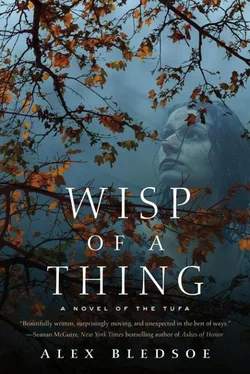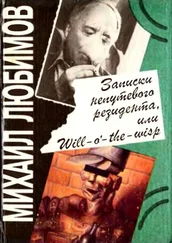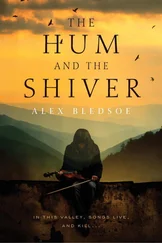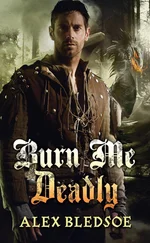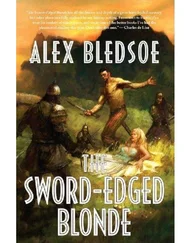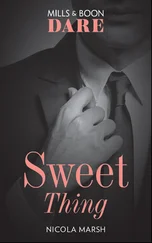When she emerged behind the motel desk, she was surprised to see another young man on the other side. This one, though, she recognized immediately. “Reverend Chess,” she said.
Craig Chess, the young Methodist minister from nearby Smithborough, said, “Hey, Ms. Peggy.” Then he saw her red eyes. “Are you all right?”
“Oh, I’m fine, Reverend.” There were no churches in Cloud County, and never would be as long as the Tufa lived here, but Craig had quietly earned the Tufa’s trust by not proselytizing or evangelizing. He simply lived his beliefs, something the Tufa understood and accepted even if they didn’t share them. “Bronwyn gave you my message, then?”
“She did.”
“Well, I sure do appreciate you coming by.”
“Always glad to help. What can I do for you?”
“Did you see that young man on the porch?”
“The one playing guitar? Yeah.”
“Did you recognize him?”
“Ms. Peggy, I’ve only lived here a little while—”
“No, not from here, he’s not one of us.”
“He’s not? He’s got the look.”
She leaned close and said quietly, “That’s Rob Quillen. ”
Just as softly, Craig asked, “Who’s Rob Quillen?”
“That boy from the TV show, So You Think You Can Sing? The one whose girlfriend died flying out to surprise him at the finals. Remember?”
“Oh, yeah. I read about that, I didn’t watch the show. That’s tragic.”
“Yes, exactly. And it’s eating that poor boy up, I can see it just as plain as I see you.” She leaned closer and said, softly and urgently, “He was just playing ‘Omie Wise.’”
Craig’s expression told her he didn’t get the significance.
Peggy continued, “If he were a Tufa, if he had even a drop of Tufa in him, I’d know what to do to help him, but I don’t. I was hoping you could point me toward something.”
He smiled sympathetically. Peggy’s genuine desire to help this stranger reminded him why, despite their prickly and evasive attitude toward strangers, he’d continued trying to earn the Tufa’s trust. “Ms. Peggy, I wish I had a simple answer for you. Grief hits everyone differently. All you can do is let him know that you’re here if he needs anything, especially if he wants to talk. That old saying about how grief shared is grief halved is usually true.”
She nodded. “Thank you, Reverend.”
Craig looked out the front window, where he could see the back of Rob’s head over the rocking chair. “Tell me, though. If it’s not rude to ask, why is he here if he’s not a Tufa?”
She shook her head. “He’s looking for something. I don’t know what, yet. I don’t think he truly knows. A little peace away from the fame, maybe. Like when Bronwyn came home from the army. How is she, by the way?”
“You’d never know she’d been hurt. Even the scars are fading.”
“That’s wonderful.”
He narrowed his eyes in playful suspicion. “Go ahead and ask. I know you want to.”
“Why, I don’t know what you mean, Reverend,” Peggy said in exaggerated innocence.
“I’ll tell you anyway. We’ve gone to the movies a couple of times, and her family’s had me over to dinner. She still hasn’t come to hear me preach, though she keeps promising she will. And that’s as far as it’s gotten.”
Peggy patted his hand on the counter. “You do still like her, though.”
“Yes, ma’am. Quite a bit.”
“You just keep doing what you’re doing, then. And thank you for getting up so early to come talk with me.”
“I’m going fishing with Bronwyn’s father and brother anyway, so I had to come through town. Always glad to stop and see that pretty smile.”
She blushed despite herself. “You are a charmer, Reverend Chess. You sure are.”
* * *
Rob watched the other man climb into the car with the blue CLERGY sticker in the corner of the windshield. He looked nothing like a Tufa, yet he also seemed thoroughly comfortable in town. He waved as he drove off, and Rob nodded in return.
The dawn shadow crept down the mountains as the sun rose. The harsh golden light instantly aged the buildings as it touched them, removing the blemish-hiding dimness that disguised cracked windows and peeling paint. What passed for a quaint village in the dimness became in full daylight an aging, impoverished small town. He played softly out of respect for both other guests and the general morning vibe.
A few men stood talking outside the convenience store across the street. They glanced his way on occasion, and even at this distance, Rob sensed their suspicion and hostility. They were also all of the same physical type: dark hair, olive skin, and wiry bodies from their hard lives. Classic Tufas, he thought, at least based on what he knew about it. And damn if he didn’t look like one of them.
Their distinctive appearance was the most obvious aspect of their mystery. Most other Appalachian natives descended from pale, fair-skinned Europeans. The Tufas, though, came from somewhere else. Some sources said their ancestors were mutinous Portuguese sailors marooned on the North Carolina coast by Columbus. Others said they were the result of interbreeding among Native Americans, freed African slaves, and various European ethnic groups. Naturally, a few errant voices called them survivors of Atlantis, Lemuria, or the Lost Tribe of Israel.
The census practices of earlier times, when people were classified as simply “white” or “other,” blurred their history ever more. Those who could pass as white did so, and denied or buried their Tufa heritage so that it was almost impossible to do significant genealogy. The only thing most experts agreed on was that the Tufas were undeniably there.
No one knew exactly why they were called “Tufa,” either; the common assumption was that it was based on a corruption of the word “tooth,” and referred to their surprisingly strong dental constitution in an area noted for significant tooth decay. “Grinning like a Tufa” literally meant smiling so wide, it showed all your teeth; more symbolically, it meant hiding your true feelings behind that smile.
He looked up as the front door opened with the slightest creak. Peggy Goins emerged and placed a coffee cup atop the decorative butter churn beside his chair. The cup rested on a matching saucer, complete with a little lace doily. Printed on the side of the cup were the words, TAKEN BY MISTAKE FROM THE CATAMOUNT CORNER, NEEDSVILLE, TN.
“You’re up awful early for a musician,” she said.
“It’s my best thinking time,” Rob said as he sipped the coffee. “Mm, thank you. That hits the spot.” He noticed that her pink fur-lined jacket matched her pink fur-lined boots. “So what is there to do around here first thing in the morning?”
“Like I said, most of our visitors tend to be here doing genealogical research. Or they spend their time in their rooms, honeymooners and such. Like the two folks opposite you. They checked in while you were out last night, I hope they didn’t bother you. Sometimes young couples can get a little overexcited.”
Could that have been the source of the cry that had awakened him? No, he was absolutely sure it had come from outside the building, from a distance. “Never even knew they were there.”
“Good. They left before dawn to go prowling in graveyards and such.”
He took another sip and said, “Wow, this is great. ”
“I’m glad you like it. I grind it myself every morning. I sing a special song over it.”
“It’s sure worth it. But let me ask you about something. Do you know of any place nearby where there might be… stone carvings?”
“I beg your pardon?”
“Places where people might have carved words into rock. A cave, maybe. Or one of those boulders that stick out of the ground.”
Читать дальше
